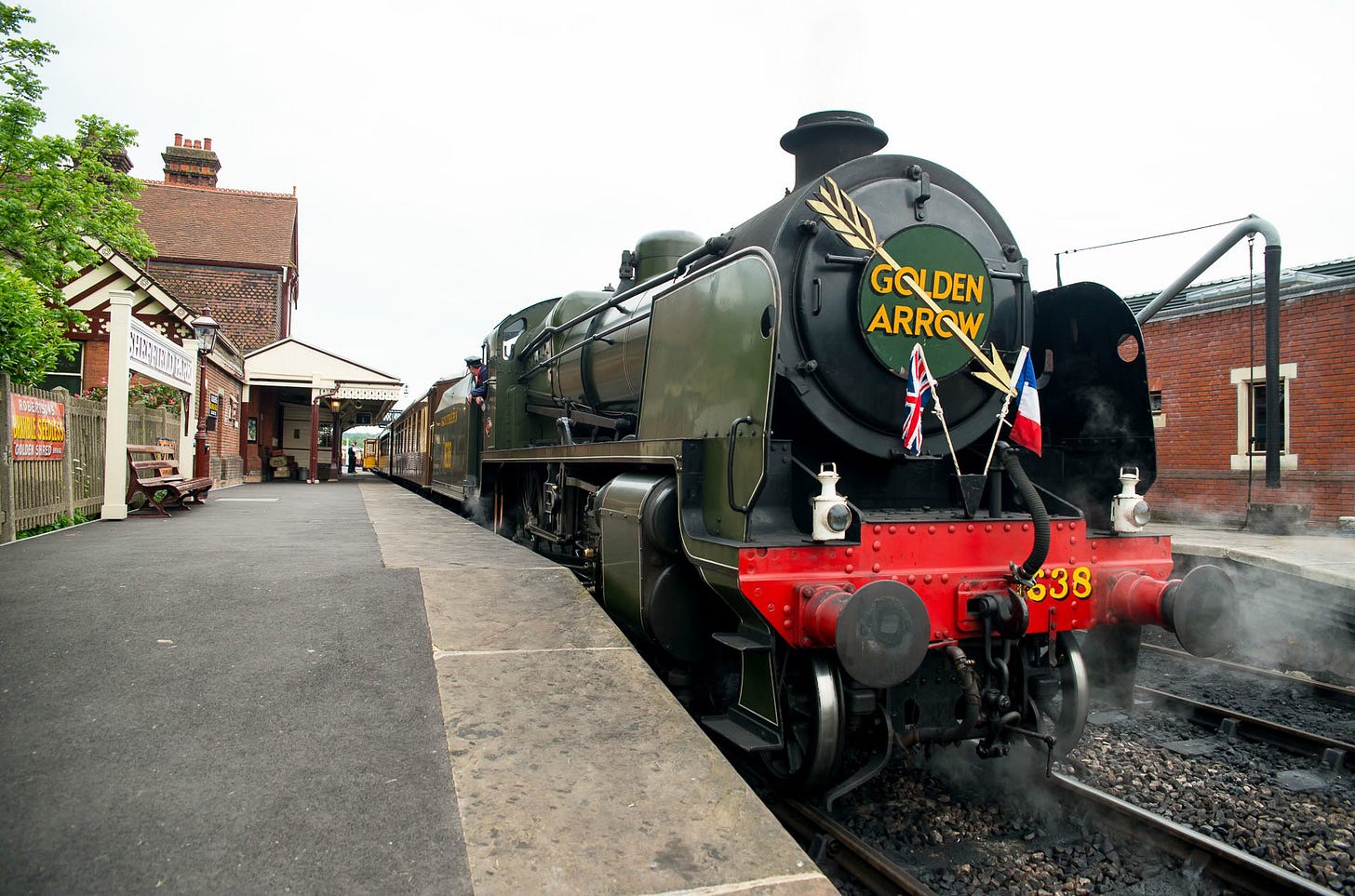In which Rebecca is inspired by her find of a letter from 1958 to take a closer look at one written by Jim to his grandparents, and reflects on two great institutions: the heritage steam railway and the handwritten thank-you letter.
Dear Reader,
Although I don’t often make a purchase, I can sometimes be found stalking eBay for vintage stationery items. I blame a combination of my desire for a traveller’s notebook and my dislike for the unpatinated appearance of brand-new leather, and although I now have a traveller’s notebook – okay, two – eBay continues to demand my attention.
My recent eBay acquisition of a battered old writing case and a letter found within it has sent me – on my computer screen at least – on a journey to 1950s Baghdad, on which I have plenty of mid-century handwriting yet to decipher. That story will come later, but today I’m sharing a 44-year-old letter on yellowing Snoopy paper written by an eleven-year-old boy of our mutual acquaintance.
Reader, he signs his letter ‘James’, but you and I both know him as Jim.
Dear Gah and Grandad
Accurate pronunciation having been an issue for her first-born grandchild, Gah was the name for Jim’s grandmother.
Families use such a variety of words to address and refer to grandparents. My mother’s and father’s parents were Grandma & Grandpa and Granny & Grandfather respectively, and I remember finding it surprising when a school friend told me that both of her grandmothers were called Grandma. ‘How do you know which one is which when you’re talking about them?’ I wondered aloud.
‘They are different people, Rebecca!’ came the unsatisfactory reply.
Well, yes. And that was exactly my point. 🙄
Some of the names used by children for their grandparents are more incongruous. I know a ‘Bamper’, whose grandson had struggled to say ‘Grandpa’, and Downton Abbey fans will know that Lord Grantham’s granddaughter Sibby calls him – to his unconcealed exasperation – ‘Donk’.
Several friends had grandmothers they called ‘Nanny’. This had always confused me, because we had ‘Nannie’ in our own lives, who, rather than being any kind of relation, had been employed by Grandfather for childcare from the arrival of his firstborn until his last child was sent away to school over a dozen years later. Nannie was involved with help, support and advice for the following two generations, and although she’s now long gone her membership of our family remains as valid as that of any one of the rest of us.
It is obvious from the many expressions of thanks in its four paragraphs that the letter from James Jim to Gah and Grandad is of the thank-you variety.
Thank you for letting me stay
Thank you for taking me to see the Engineurim
Thank you for letting me borrow the train
Thanks again for everything
I remember that my brother and I had lost points with various relatives the first 1980s Christmas after Dad had sent away our BBC B Micro home computer for it to have newfangled word-processing software installed. And now we had a printer, too – a vast dot-matrix affair which used perforated listing paper with those funny holes down the sides.

I couldn’t understand why my brother was bounding up the stairs every time he’d finished opening one of his presents, and on the third or fourth occasion I followed him. He was sitting in front of the chunky monitor on Dad’s desk.
‘What are you doing?’
‘Writing a thank-you letter!’ he told me. ‘I’m writing one as soon as I open each present, so that I don’t have a whole load to do at once after Christmas.’
Wow. Reader, I wanted in!
After it came to our attention shortly after Christmas that some recipients had been rather less impressed than we were with our computer-created correspondence, our future thank-you letters were written neatly by hand.
Jim’s thank-you letter is dated April 11, 1980, and with Easter that year having fallen on April 6 it is clear that Gah and Grandad had had him to stay during the school Easter break.
Thank you for letting me stay and help Grandad get the trains out.
Jim’s Grandad had been all about trains. He had come from a railway family, and started his own career with Southern Railways in the 1920s. In 1958 he was instrumental in the founding of the Bluebell Railway, the world’s first standard gauge preservation steam railway, and worked hard in his spare time to get the line up and running. After retiring from British Railways he became Superintendent and then President of the Bluebell, and both he and the railway flourished.
Bernard John Holden MBE (15 March 1908 – 4 October 2012)
🚂
An English railway engineer and manager with Southern and British Railways and a founding father of standard gauge railway preservation in the United Kingdom. He was President of the Bluebell Railway in Sussex for over twenty years until his death.
🚂
Taken from Wikipedia

I realy enjoyed it espiecaly when Grandad got the steam ones out.
I asked Jim about this.
‘They were real steam trains: ‘0’ gauge, with actual boilers and water which made steam. We’d set them up outside the back door. That was very cool.
‘I can remember the smell of meths. You soaked a cube of something in it, and you lit it and put it into the firebox which warmed the water which created the steam which made the engine go. Making them stop was fun, because the levers for controlling the speed and for stopping the train were in the cab, and if you wanted to stop the train at full steam you had to be really quick to grab it before it shot past.’
He paused.
‘Or you just drank tea until the train had run out of steam. Grandad did, anyway. I remember the trains steamed and spluttered, and they were hot. It was a living, breathing proper railway, just on a smaller scale.
‘Grandad was 72 when I wrote him that letter, and as far as the trains were concerned, he was more of a kid than me. It’s hard to know who was more excited about them!’
Thank you for taking me to see the Engineurim.
Brighton & Hove Engineerium was an engineering and steam power museum located on the Sussex coast. It’s closed now, but at around the time that Jim was writing his letter it had around 1,500 exhibits on display, and the boilers and Number 2 Engine would be fired up every weekend.
‘I liked the Engineerium. We looked at the big wheel thing1 and we looked at the big boilers, which were obviously just a bigger version of the engine that we’d been playing with at home. The big boilers were driving the big wheel thing. Grandad knew somebody there thanks to his connections through the railway, and he showed us round. And we sat in the big wheel – climbed up in it and over it.’
Thank you for letting me borrow the train…
‘Which train did you borrow?’ I asked Jim.
‘Not one of his big ‘0’ gauge ones, that’s for sure. My train set at home – sprawled permanently across Mum and Dad’s attic – was ‘00’ gauge, so he would’ve lent me one of those.
‘The ‘0’ gauge trains were great. Playing with those was something that Grandad had done with his sons – Dad and my uncle – in the garden, and it was amazing, because the track went in and out of their garden shed, through two little arches like mouseholes. If it was raining, the boys would keep dry by running the trains from the garden shed – which of course they called the ‘loco shed’. There were even snowploughs for the track for when it snowed!’
…and the £5 for North Wales
Reader, I was curious. ‘What did you do in North Wales?’
‘It was a week-long school trip. I think Gah and Grandad were so generous (£5 in 1980 would be worth well over £20 today2) because I was going to be taken to the Ffestiniog steam railway, where one of the early meetings about the Bluebell had been held. Ffestiniog is the oldest preserved narrow gauge preservation steam railway, and Bluebell was the first standard gauge one.’
Jim’s and Grandad’s shared passion for steam billows all the way through this decades-old letter. Yes, the stories of both water pump and yugots (sorry, yoghurts) remain untapped, but for now I’ll leave Jim James and his memories of Gah and Grandad wrapped up in that little cloud of mystery.
Love,
Rebecca
📚 Reading📚
📚
by is always an engaging highlight of my Substack inbox. This recent favourite of mine features some letters of apology, and it’s super:📚 Other people’s letters and notes, perhaps because they weren’t ever necessarily intended for examination by anyone beyond the writer or the named recipient, make for fascinating reading. And no, this doesn’t mean that I’m nosing through your mail or your journals!
Do check out
by , whose commentaries on the notes and journals of – among many others – writers, artists, politicians and musicians – are absolutely brilliant. Here’s her post on some notes about notes, namely Niklas Luhmann’s words about his Zettelkasten system:📚 Back to the subject of letters, and regular readers of ‘Dear Reader, I’m Lost' will be no strangers to my ongoing light-hearted letter-writing project with fellow Brit
of . It’s my turn to reply to him on Wednesday, and you can find the archive of our chortlesome correspondence here.Terry writes on a variety of subjects in his own newsletters, and his regular Experiments in style posts – in which he, as he puts it, ‘tells the same story in umpteen different ways’ – are among my favourites. This one, in which he has written his story in the style of an art critic, is terrific:
If you’ve enjoyed this post, please let me know by clicking the heart. Thank you!
Thank you for reading! If you enjoy ‘Dear Reader, I’m lost’, please share and subscribe for free.
Number 2 Engine.
According to inflationtool.com £5 in 1980 was worth £21.19 in 2023.










How did Jim reacquire this letter? Upon Gah’s death?
What a sweet Thank you note and good on Jim’s parents for most likely encouraging the note.
I love all the various names grandparents give themselves. My FIL was Papa Ted because our kids couldn’t say the word, Grandpa. My mom is Bubbe to my kids. So much love in these names.
When I was about 13 years old my father organized a trip to Wales for our family. We flew from JFK to London to Manchester, then spent a week in a grand hotel in Barmouth. My dad, being a poetic fellow, assembled us all on the Barmouth footbridge over Afon Mawddach at low tide and recited Crossing the Bar from memory. Forty years later, a soloist sang a version of the Tennyson poem at his memorial service. Not a dry eye in the house, especially mine! And I can always remember him wrong-side-driving us around Wales, and when the mood struck, he'd declaim "Blaenau FFestiniog!" for the sheer pleasure of it. He probably had the pronunciation wrong, but we weren't in a position to criticize.